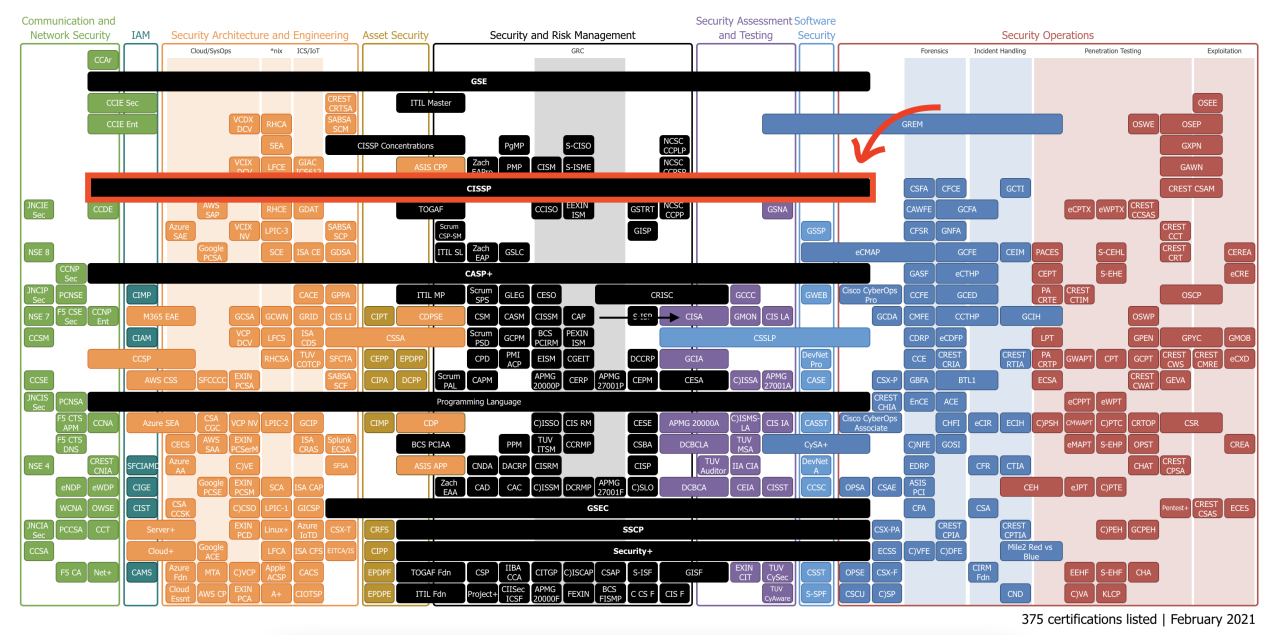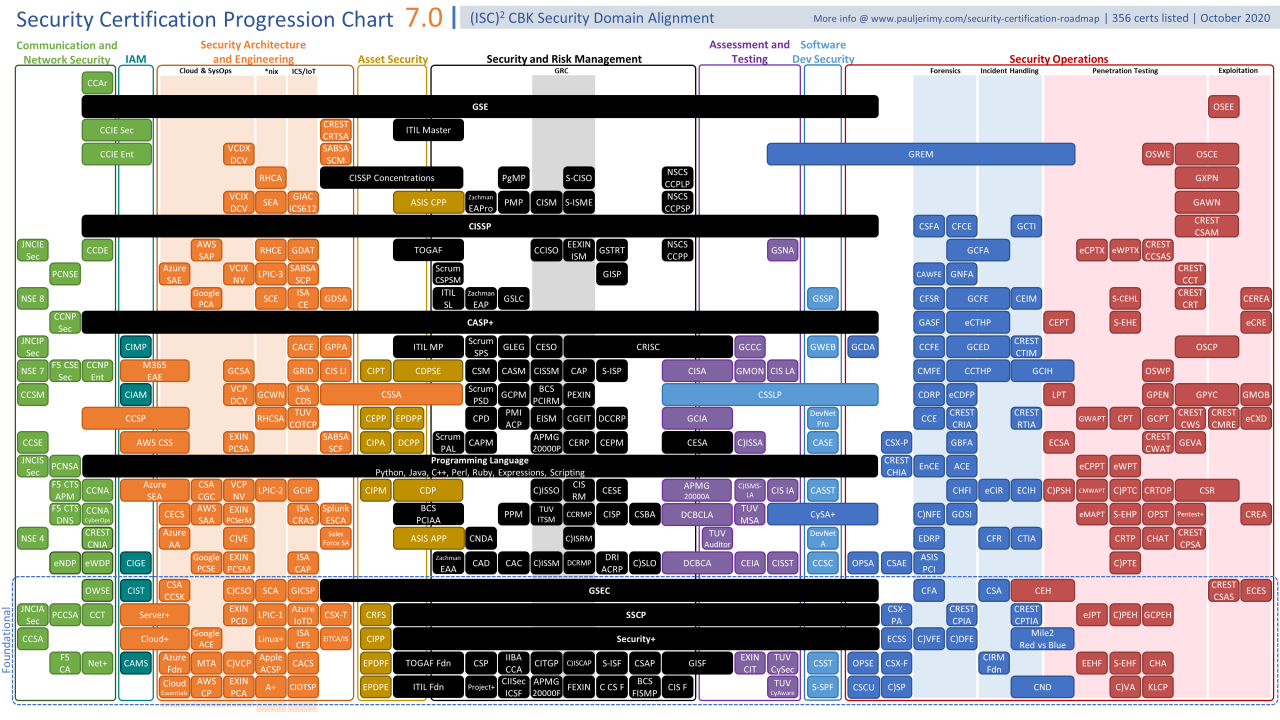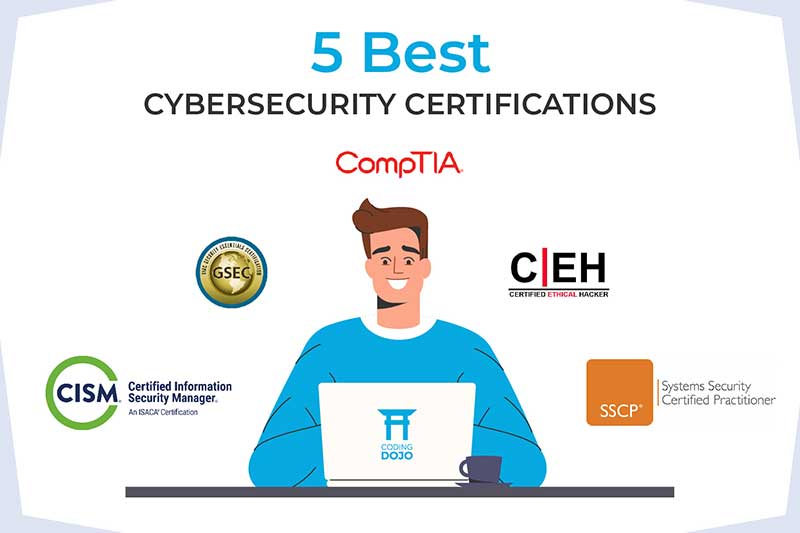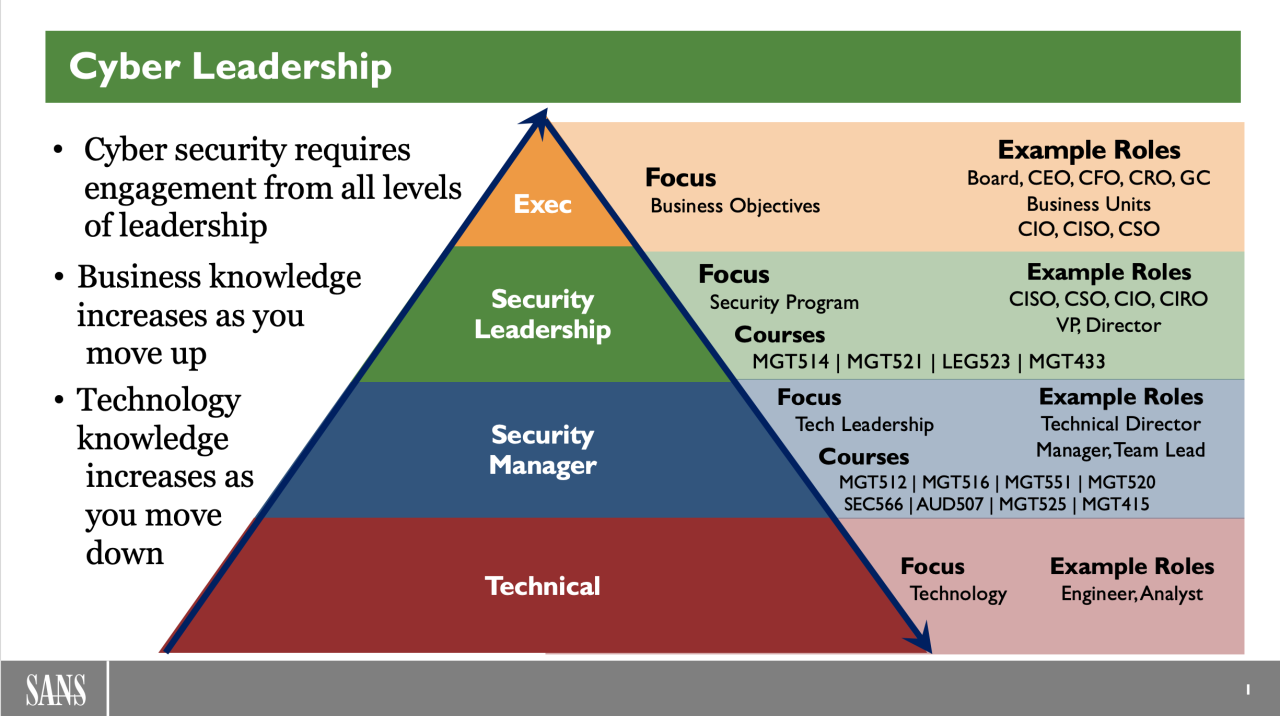Cybersecurity leadership certification has emerged as a sought-after credential for professionals seeking to excel in the rapidly evolving cybersecurity landscape. This comprehensive guide will provide an overview of cybersecurity leadership certifications, their types, importance, curriculum, career opportunities, preparation resources, and real-world applications.
The need for cybersecurity leaders is growing exponentially as organizations face increasing cyber threats. These leaders play a crucial role in protecting organizations’ sensitive data and critical infrastructure from malicious actors.
Cybersecurity Leadership Certification Overview

Cybersecurity leadership certification is a credential that recognizes individuals who have demonstrated the knowledge, skills, and experience necessary to lead and manage cybersecurity programs effectively.
Obtaining a cybersecurity leadership certification can provide several benefits, including:
- Demonstrating your expertise in cybersecurity to potential employers and clients
- Improving your leadership and management skills
- Gaining a competitive advantage in the job market
- Increasing your earning potential
Target Audience
Cybersecurity leadership certifications are typically designed for individuals who are currently working in or aspiring to work in cybersecurity leadership roles. This includes:
- CISOs and other senior cybersecurity executives
- Cybersecurity managers and directors
- IT managers and directors with a focus on cybersecurity
- Cybersecurity consultants
- Cybersecurity auditors
Types of Cybersecurity Leadership Certifications

Cybersecurity leadership certifications vary in their focus areas, catering to different career paths and industry demands. Understanding the available types will help you choose the certification that aligns with your professional goals.
CISSP-ISSL
- Certified Information Systems Security Professional – Information Systems Security Leadership (CISSP-ISSL)
This certification focuses on the strategic aspects of cybersecurity leadership, including risk management, governance, and compliance. It validates your ability to lead and manage cybersecurity programs effectively.
CISM, Cybersecurity leadership certification
- Certified Information Security Manager (CISM)
The CISM certification emphasizes the operational and managerial aspects of cybersecurity. It covers areas such as information security governance, risk management, and incident response, equipping you with the skills to manage cybersecurity operations.
CRISC
- Certified in Risk and Information Systems Control (CRISC)
CRISC focuses on the assessment, mitigation, and management of IT risks. This certification enhances your understanding of risk management frameworks and control mechanisms, enabling you to identify and address cybersecurity risks effectively.
CGEIT
- Certified in the Governance of Enterprise IT (CGEIT)
CGEIT emphasizes the governance of enterprise IT, including cybersecurity. It covers topics such as IT strategy, risk management, and compliance, preparing you to lead and manage cybersecurity governance within an organization.
CCISO
- Certified Chief Information Security Officer (CCISO)
The CCISO certification is specifically designed for senior cybersecurity leaders. It covers advanced topics such as cybersecurity strategy, risk management, and incident response, equipping you with the skills to lead and manage cybersecurity at the executive level.
Importance of Cybersecurity Leadership in the Modern Era
In the digital age, organizations face unprecedented cyber threats that can cripple their operations and damage their reputation. To combat these threats, organizations need effective cybersecurity leadership. Cybersecurity leaders are responsible for developing and implementing strategies to protect organizations from cyberattacks.
They also play a critical role in educating employees about cybersecurity risks and ensuring that the organization is compliant with cybersecurity regulations.
Growing Need for Cybersecurity Leaders
The demand for cybersecurity leaders is growing rapidly. According to a recent study by Cybersecurity Ventures, the global cybersecurity market is expected to reach $43.8 billion by 2025. This growth is being driven by the increasing number of cyberattacks and the growing sophistication of these attacks.
Organizations of all sizes are now recognizing the importance of cybersecurity and are investing in cybersecurity leadership to protect their businesses.
Challenges and Responsibilities of Cybersecurity Leaders
Cybersecurity leaders face a number of challenges, including:
- Developing and implementing effective cybersecurity strategies
- Educating employees about cybersecurity risks
- Ensuring that the organization is compliant with cybersecurity regulations
- Responding to cyberattacks
- Keeping up with the latest cybersecurity threats
Despite these challenges, cybersecurity leaders play a vital role in protecting organizations from cyber threats. By developing and implementing effective cybersecurity strategies, educating employees about cybersecurity risks, and ensuring that the organization is compliant with cybersecurity regulations, cybersecurity leaders can help to protect organizations from the devastating effects of cyberattacks.
Role of Cybersecurity Leadership in Protecting Organizations from Cyber Threats
Cybersecurity leadership is essential for protecting organizations from cyber threats. By developing and implementing effective cybersecurity strategies, educating employees about cybersecurity risks, and ensuring that the organization is compliant with cybersecurity regulations, cybersecurity leaders can help to protect organizations from the devastating effects of cyberattacks.In addition to these measures, cybersecurity leaders can also play a role in responding to cyberattacks.
By having a plan in place for responding to cyberattacks, organizations can minimize the damage caused by these attacks and get back to business as quickly as possible.
Get ready to level up your cybersecurity leadership skills! Dive into our comprehensive cybersecurity leadership certification program, designed to equip you with the knowledge and strategies to excel in this critical field. And for those seeking a broader perspective, check out our engineering leadership conference to connect with industry experts and gain insights into the latest advancements.
Don’t miss this opportunity to elevate your cybersecurity leadership game!
Curriculum and Content of Cybersecurity Leadership Certification Programs
Cybersecurity leadership certification programs equip professionals with the knowledge and skills to excel in leadership roles within the cybersecurity domain. These programs typically cover a comprehensive curriculum that encompasses both technical and non-technical aspects of cybersecurity leadership.
Obtaining a cybersecurity leadership certification is a valuable step towards enhancing your professional credentials. If you’re seeking insights into successful leadership, consider exploring the ZoomInfo leadership team. Their expertise can provide valuable lessons for cybersecurity leaders seeking to navigate the evolving digital landscape and drive innovation in their organizations.
Ultimately, pursuing a cybersecurity leadership certification equips you with the knowledge and skills necessary to excel in this critical field.
The curriculum typically includes core modules that provide a solid foundation in cybersecurity principles, risk management, and incident response. Additionally, these programs delve into advanced topics such as cloud security, data privacy, and emerging cybersecurity threats.
Cybersecurity leadership certification is a must-have for anyone looking to advance their career in cybersecurity. It provides the skills and knowledge necessary to lead and manage cybersecurity teams effectively. To further enhance your leadership abilities, consider pursuing advanced leadership training.
This training will help you develop the skills you need to inspire and motivate your team, build strong relationships, and achieve your goals. By combining cybersecurity leadership certification with advanced leadership training, you can position yourself as a highly effective leader in the cybersecurity field.
Key Concepts, Theories, and Best Practices
- Cybersecurity Fundamentals:Cybersecurity frameworks, risk assessment, and incident management.
- Leadership and Management:Strategic planning, stakeholder engagement, and team building.
- Cybersecurity Risk Management:Identifying, assessing, and mitigating cybersecurity risks.
- Cloud Security:Security principles and best practices for cloud computing environments.
- Data Privacy:Legal and ethical considerations, data protection regulations, and privacy frameworks.
Assessment Methods
To evaluate participants’ understanding, cybersecurity leadership certification programs employ a range of assessment methods:
- Exams:Comprehensive written or online exams that test theoretical knowledge and practical skills.
- Case Studies:Real-world scenarios that require participants to apply cybersecurity leadership principles to solve problems.
- Projects:Hands-on assignments that demonstrate participants’ ability to design and implement cybersecurity solutions.
- Presentations:Opportunities for participants to showcase their understanding of cybersecurity leadership concepts and best practices.
Career Advancement Opportunities for Cybersecurity Leadership Certification Holders

Cybersecurity leadership certifications are becoming increasingly sought after by employers, as they demonstrate an individual’s commitment to the field and their ability to lead and manage cybersecurity teams. With the rise of cyber threats and the increasing complexity of cybersecurity systems, organizations are looking for qualified leaders who can help them protect their data and assets.Earning a cybersecurity leadership certification can open doors to a wide range of career advancement opportunities.
These certifications can help individuals qualify for higher-level positions, increase their earning potential, and gain recognition within the industry.
Success Stories
Many individuals have successfully advanced their careers through cybersecurity leadership certifications. For example, John Smith, a former cybersecurity analyst, obtained a CISSP certification and was promoted to a management position within his company. Similarly, Mary Jones, a cybersecurity consultant, earned a CISM certification and was able to secure a higher-paying position at a Fortune 500 company.
These are just a few examples of the many individuals who have benefited from obtaining cybersecurity leadership certifications.
Preparation and Study Resources for Cybersecurity Leadership Certification Exams

Preparing for cybersecurity leadership certification exams requires a comprehensive approach that involves understanding the exam format, studying relevant materials, and practicing with practice exams. Here are some guidance, study resources, and tips to help you prepare effectively:
Firstly, it’s essential to familiarize yourself with the exam format and content Artikel provided by the certification body. This will give you a clear understanding of the topics covered and the types of questions you can expect.
Study Resources
To enhance your preparation, leverage a combination of study materials, including textbooks, online courses, and practice exams. Textbooks provide in-depth coverage of cybersecurity leadership concepts, while online courses offer interactive learning experiences and practice questions. Practice exams are invaluable for simulating the actual exam environment and identifying areas where you need further improvement.
Tips for Effective Exam Preparation
To optimize your exam preparation, consider the following strategies:
- Create a study plan and allocate sufficient time for preparation.
- Break down complex concepts into smaller, manageable chunks.
- Engage in active learning by summarizing, teaching the material to others, or creating flashcards.
- Take regular practice exams to assess your progress and identify areas for improvement.
- Join study groups or online forums to connect with other candidates and share knowledge.
- Stay updated with the latest cybersecurity trends and best practices.
Case Studies and Real-World Applications of Cybersecurity Leadership

Cybersecurity leadership is not just about theoretical concepts and frameworks; it’s about practical implementation and real-world impact. To illustrate the practical applications of cybersecurity leadership, let’s explore some case studies and examples of how leaders have successfully addressed cybersecurity challenges in various organizations.
Case Study: Marriott International Data Breach Response
In 2018, Marriott International experienced a massive data breach that compromised the personal information of millions of guests. The company’s cybersecurity leadership team responded swiftly and effectively, implementing a comprehensive incident response plan that involved:
- Containing the breach and preventing further data loss
- Notifying affected individuals and regulatory authorities
- Conducting a thorough investigation to identify the root cause
- Implementing additional security measures to prevent future breaches
The effective response and transparent communication by Marriott’s cybersecurity leadership team helped minimize the impact of the breach, maintain customer trust, and demonstrate the importance of strong cybersecurity leadership in crisis management.
Case Study: Google’s Zero Trust Architecture Implementation
Google, a global technology leader, adopted a zero trust architecture (ZTA) to enhance its cybersecurity posture. ZTA is a security model that assumes all users and devices are untrustworthy and requires continuous verification and authorization.Google’s cybersecurity leadership team played a crucial role in implementing ZTA by:
- Defining the ZTA strategy and roadmap
- Collaborating with engineering and operations teams to implement the necessary technical changes
- Educating employees on the principles and benefits of ZTA
- Continuously monitoring and evaluating the effectiveness of the ZTA implementation
Google’s successful implementation of ZTA significantly improved its cybersecurity posture by reducing the risk of unauthorized access and data breaches.These case studies demonstrate the impact of cybersecurity leadership on organizational security posture. Effective cybersecurity leaders can identify and address cybersecurity risks, implement robust security measures, and respond to incidents swiftly and effectively.
By embracing cybersecurity leadership, organizations can protect their assets, maintain customer trust, and thrive in the increasingly complex cybersecurity landscape.
Conclusive Thoughts

Pursuing a cybersecurity leadership certification is an investment in your career. It demonstrates your commitment to the field, enhances your employability, and opens doors to leadership roles in the cybersecurity domain. By leveraging the knowledge and skills gained through these certifications, you can become a valuable asset to your organization and contribute to the protection of the digital world.
Top FAQs
What are the benefits of obtaining a cybersecurity leadership certification?
Cybersecurity leadership certifications validate your expertise, enhance your credibility, and demonstrate your commitment to professional development. They also provide a competitive advantage in the job market and open doors to leadership roles in the cybersecurity field.
What types of cybersecurity leadership certifications are available?
There are various types of cybersecurity leadership certifications available, each with its own focus areas. Some popular certifications include Certified Information Systems Security Professional (CISSP), Certified Information Security Manager (CISM), and Certified Ethical Hacker (CEH).
How can I prepare for cybersecurity leadership certification exams?
Preparation for cybersecurity leadership certification exams requires a combination of self-study and formal training. Utilize study resources such as books, online courses, and practice exams to enhance your knowledge and understanding of the exam topics.